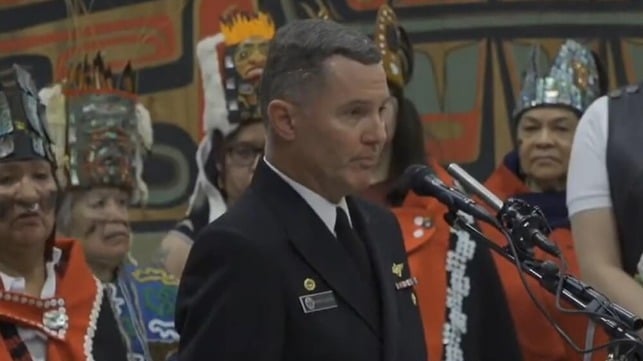After 140 Years, U.S. Navy Apologizes for Attack on Alaskan Village

The U.S. Navy has formally apologized for an attack on the village of Angoon, Alaska in October 1882. The naval bombardment of the town was intended as a punitive lesson for the tribe's threats to attack a whaling station - an attack that was not planned and never occurred, according to the local populace. The death toll from the burning of the village included six Tlingit children, and the survivors reported several hard winters after the destruction of all food stores, fishing canoes and residential structures.
All parties agree that the interaction began when a Tlingit man employed by the North West Trading Company was killed by an exploding harpoon gun or whaling bomb. Following the employee's accidental death, the whaling station managers reported unrest among the native populace and called for help from the Revenue Service, which then governed Alaska.
The manager recounted that the local tribe "demanded two hundred blankets, at the same time seizing the whaling-boats with their equipments, and holding two of the white men prisoners until the amount should be paid," reported Lt. M.A. Healy of the U.S. Revenue Service in an after-action report.
In the event that the death compensation payment was not handed over, "the natives threatened to burn the company's store and buildings, destroy the boats, and put to death the white prisoners," Healy recounted.
According to Healy, two hostages were immediately freed on the arrival of a joint Revenue Service-Navy raiding party. After negotiations, on-scene commander Capt. E. C. Merriman demanded 400 blankets from the local population as a guarantee for "future good behavior," twice the payment the tribe had demanded in compensation for the fatal accident. When the Tlingit refused, the Navy and an accompanying Coast Guard cutter shelled and burned the settlement. "As a lesson to the young men and squaws they [the village elders] were glad I had burned the village," Capt. Merriman later wrote. The Portland Board of Trade and the Revenue Service's regional customs collector both thanked Merriman for his services to commerce.
Local Tlingit representatives claim that the hostage-taking never occurred and that the whaling station's managers overreacted when the villagers painted their faces in mourning. The Navy's attack, the tribe claimed, happened without any provocation at all.

that matters most
Get the latest maritime news delivered to your inbox daily.
The Tlingit won a civil settlement for the damage in 1973, and the U.S. Navy issued a brief statement of regret in 1982, saying that it "should never have happened" and was "an unfortunate event in our history." On Saturday, after an additional four decades of petitioning, the service issued a full apology in a ceremony in Angoon. Both of Alaska's senators, Dan Sullivan and Lisa Murkowski (R-AK), attended for the formal apology.
"The Navy recognizes the pain and suffering inflicted upon the Tlingit people, and we acknowledge these wrongful actions resulted in the loss of life, the loss of resources, the loss of culture, and created and inflicted intergenerational trauma on these clans," Northwest Region Commander Rear Adm. Mark B. Sucato said at a ceremony Saturday. He added that "the Navy takes the significance of this action very, very seriously and knows an apology is long overdue."
